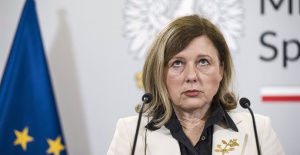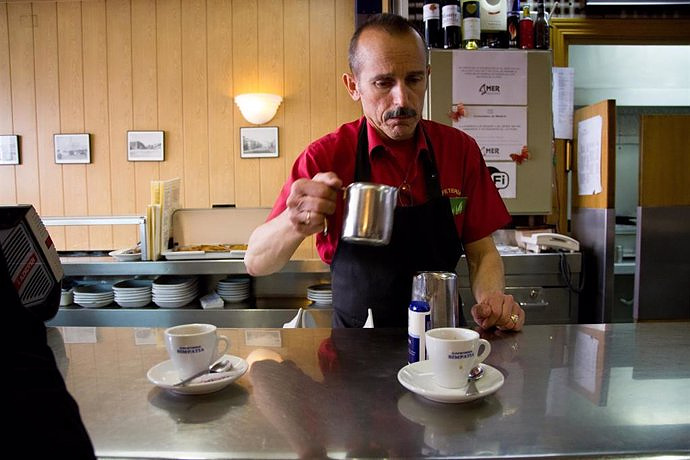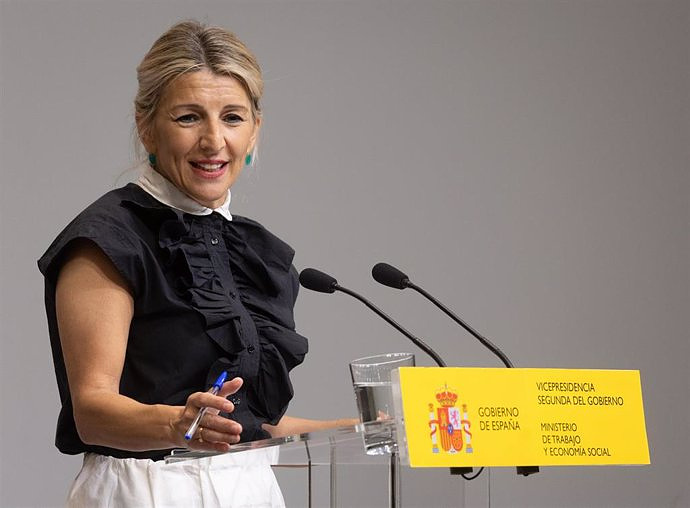Elorza believes that until now "that role" has been taken away from Parliament and that it would be good to strengthen the "separation of powers"
MADRID, 31 Dic. (EUROPA PRESS) -
The PSOE spokesman in the Constitutional Commission of Congress, Odón Elorza, considers that the president of the Lower House, Meritxell Batet, and the president of the Senate, Ander Gil, should get involved to try to unblock the current situation and renew the members of the Council General of the Judiciary (CGPJ) who have had their mandate expired for more than four years.
In Elorza's opinion, throughout this process "Parliament" has been "subtracted" from the role that corresponds to it legally and constitutionally, since the Courts are in charge of appointing the twenty members that make up the governing body of judges. Each Chamber elects ten members (six active judges and four renowned jurists).
Since September 2018, three months before the end of the mandate of the members elected in 2013, the Congress and the Senate have in their hands the list of 51 judges or magistrates aspiring to become members for the judicial shift. All of them obtained twenty-five endorsements from members of the judicial career also in active service or that of a judicial association, as established by current legislation.
However, the election process has been paralyzed since then due to the lack of agreement between the two main parties. The norm establishes that both the members of the judicial turn and that of jurists will be chosen by three fifths of the Chambers, which forces the PSOE and the PP to agree on the names in both cases.
Elorza maintains that, if the blockade persists by the PP, perhaps there will be no other choice than to modify the law to lower the majority necessary for the appointment of the members, but he is in favor of making one last attempt to find consensus and is in favor of the negotiations that until now have fallen to the Minister of the Presidency, Félix Bolaños, and the Vice-Secretary for Institutional Policy and MEP of the PP, Esteban González Pons, are led by the presidents of both Chambers.
"It could be said that what I am proposing is naive, but it is what the law establishes," said the Basque deputy in statements to Europa Press. "This procedure has not been developed in Parliament because it has always been the habit of entrusting this task of negotiation and agreement to the two political parties that have negotiated it in a room either in Moncloa or in Genoa. That procedure has been subtracted paper to Parliament", he adds.
In this context, it proposes that Batet and Gil, "consulting the process to follow with the Tables of both Chambers", be the ones to direct this negotiation "in the parliamentary framework" and, specifically, in the Board of Spokesmen, where representatives have seats of all groups.
That is the area in which, from his point of view, the twelve called to become members should be selected from the list of candidates sent by judges and also from which the six consensus jurists should emerge.
"If this process is not culminated in this way, which is as established by law, I fully accept that the majorities be changed, although it is true that it would be desirable to try to maintain the requirement of a qualified majority to force consensus," he adds.
To this he adds that parliamentary groups should have "the intellectual generosity" not to put "partisan" proposals on the table, but instead opt for people with "a track record, solvency and guarantee of independence when it comes to carrying out their function." "The distribution based on absolutely partisan quotas is not good," he warns.
In addition, Elorza maintains that the procedure that he defends would also resolve the recommendations that the European Union has been making in this matter and "would help to give more guarantees and make the separation of powers more effective", as well as "break a little the scheme of operation between the conservative or progressive blocs".

 Exploring Cardano: Inner Workings and Advantages of this Cryptocurrency
Exploring Cardano: Inner Workings and Advantages of this Cryptocurrency Seville.- Economy.- Innova.- STSA inaugurates its new painting and sealing hangar in San Pablo, for 18 million
Seville.- Economy.- Innova.- STSA inaugurates its new painting and sealing hangar in San Pablo, for 18 million Innova.- More than 300 volunteers join the Andalucía Compromiso Digital network in one month to facilitate access to ICT
Innova.- More than 300 volunteers join the Andalucía Compromiso Digital network in one month to facilitate access to ICT Innova.-AMP.- Ayesa acquires 51% of Sadiel, which will create new technological engineering products and expand markets
Innova.-AMP.- Ayesa acquires 51% of Sadiel, which will create new technological engineering products and expand markets The Prado will exhibit Caravaggio's 'Ecce Homo' from May 28 after a temporary loan agreement with Conalghi
The Prado will exhibit Caravaggio's 'Ecce Homo' from May 28 after a temporary loan agreement with Conalghi The judge officiates the UCO of the Civil Guard in the case against Begoña Gómez for alleged influence peddling
The judge officiates the UCO of the Civil Guard in the case against Begoña Gómez for alleged influence peddling Brussels sees no more risk for the rule of law in Poland and is preparing to close the sanctioning file
Brussels sees no more risk for the rule of law in Poland and is preparing to close the sanctioning file The PP calls to mobilize on May 26 against the amnesty, the "hoaxes" and the "suspicion of corruption" of the Government
The PP calls to mobilize on May 26 against the amnesty, the "hoaxes" and the "suspicion of corruption" of the Government How Blockchain in being used to shape the future
How Blockchain in being used to shape the future Not just BTC and ETH: Here Are Some More Interesting Coins Worth Focusing on
Not just BTC and ETH: Here Are Some More Interesting Coins Worth Focusing on UMH researchers are working on a high-quality apricot crop that requires less irrigation water
UMH researchers are working on a high-quality apricot crop that requires less irrigation water The UPV develops an application to improve the quality of life of patients with glioblastoma
The UPV develops an application to improve the quality of life of patients with glioblastoma A sensor system obtains the fingerprint of essential oils and detects if they have been adulterated
A sensor system obtains the fingerprint of essential oils and detects if they have been adulterated Faraday UPV presents the 'Origin' rocket to exceed 10 km of flight: "It is the beginning of the journey to space"
Faraday UPV presents the 'Origin' rocket to exceed 10 km of flight: "It is the beginning of the journey to space" A million people demonstrate in France against Macron's pension reform
A million people demonstrate in France against Macron's pension reform Russia launches several missiles against "critical infrastructure" in the city of Zaporizhia
Russia launches several missiles against "critical infrastructure" in the city of Zaporizhia A "procession" remembers the dead of the Calabria shipwreck as bodies continue to wash up on the shore
A "procession" remembers the dead of the Calabria shipwreck as bodies continue to wash up on the shore Prison sentences handed down for three prominent Hong Kong pro-democracy activists
Prison sentences handed down for three prominent Hong Kong pro-democracy activists ETH continues to leave trading platforms, Ethereum balance on exchanges lowest in 3 years
ETH continues to leave trading platforms, Ethereum balance on exchanges lowest in 3 years Investors invest $450 million in Consensys, Ethereum incubator now valued at $7 billion
Investors invest $450 million in Consensys, Ethereum incubator now valued at $7 billion Alchemy Integrates Ethereum L2 Product Starknet to Enhance Web3 Scalability at a Price 100x Lower Than L1 Fees
Alchemy Integrates Ethereum L2 Product Starknet to Enhance Web3 Scalability at a Price 100x Lower Than L1 Fees Mining Report: Bitcoin's Electricity Consumption Declines by 25% in Q1 2022
Mining Report: Bitcoin's Electricity Consumption Declines by 25% in Q1 2022 Oil-to-Bitcoin Mining Firm Crusoe Energy Systems Raised $505 Million
Oil-to-Bitcoin Mining Firm Crusoe Energy Systems Raised $505 Million Microbt reveals the latest Bitcoin mining rigs -- Machines produce up to 126 TH/s with custom 5nm chip design
Microbt reveals the latest Bitcoin mining rigs -- Machines produce up to 126 TH/s with custom 5nm chip design Bitcoin's Mining Difficulty Hits a Lifetime High, With More Than 90% of BTC Supply Issued
Bitcoin's Mining Difficulty Hits a Lifetime High, With More Than 90% of BTC Supply Issued The Biggest Movers are Near, EOS, and RUNE during Friday's Selloff
The Biggest Movers are Near, EOS, and RUNE during Friday's Selloff Global Markets Spooked by a Hawkish Fed and Covid, Stocks and Crypto Gain After Musk Buys Twitter
Global Markets Spooked by a Hawkish Fed and Covid, Stocks and Crypto Gain After Musk Buys Twitter Bitso to offset carbon emissions from the Trading Platform's ERC20, ETH, and BTC Transactions
Bitso to offset carbon emissions from the Trading Platform's ERC20, ETH, and BTC Transactions Draftkings Announces 2022 College Hoops NFT Selection for March Madness
Draftkings Announces 2022 College Hoops NFT Selection for March Madness




























